When Khalid Masud Khattak, a retired Pakistani civil servant married a German lady named Ruth Seul in 1982, little did he know how much their families had in common, despite belonging to completely different continents and hailing from very distinct cultures.
In fact, the roots of their connection stem from World Wars One and Two, wars that began in Europe but were fought by soldiers from almost every part of the globe.
Khalid’s father, Col (retd) Sultan Ahmed Jan Khattak, fought on the British side in World War Two while Ruth’s father Lieutenant Hans Seul (Sr) fought for The Kaiser in World War. His son, Ruth’s brother and Khalid Khattak’s brother-in-law fought in the Second World War as part of Hitler’s Wehrmacht. Ironically, all three of these officers served in the Artillery.
This is the story of a unique family feud. The characters: two Pakistani men, two German men and a German woman — all linked in a curious connection of duty, glory, love and valour
Sultan Ahmed Jan Khattak served as captain in the Maratha-Mahar Regiment in World War II. In 1947, he was absorbed by the Baloch Regiment and in 1950, he voluntarily joined the Pakistan Artillery from where he retired as a colonel.
Ruth’s family also boasted a splendid military pedigree, with her father, Lieutenant Hans Seul (Sr) a lieutenant in the Artillery on one of the bloodiest battlefields of the Western Front of World War One; the French killing ground that was Verdun. After the armistice, he left the army and got a degree in mechanical engineering from Freiburg and later worked for an Italian company, a career move that would eventually lead to his daughter marrying a Pakistani. Towards the end of World War II, when Germany was desperately short of manpower, he was recalled to serve in the Volksstrum and was eventually captured by the victorious Allied forces. The Volkssturm or ‘people’s militia’ was set up on the orders of Adolf Hitler in 1944, in the last months of World War II. Post-war Germany was economically devastated so Seul answered an ad for cement engineers in Pakistan in a German newspaper. In 1957, he came to Pakistan and joined the Dalmia Cement Factory as chief engineer.
Ruth followed him to Pakistan and met Khalid through a common friend. Since she belonged to an aristocratic family, they shared many common interests like history and the military, and shared a common passion for dogs and horses. After about a month’s courtship, they got married. She passed away in 2007 on the same day, perhaps even the same time as Benazir Bhutto.
Khalid’s father, Col (retd) Sultan Ahmed Jan Khattak, fought on the British side in World War Two while Ruth’s father Lieutenant Hans Seul (Sr) fought for The Kaiser in World War. His son, Ruth’s brother and Khalid Khattak’s brother-in-law fought in the Second World War as part of Hitler’s Wehrmacht. Ironically, all three of these officers served in the Artillery.
Ruth’s brother, the late Lieutenant Hans Seul (Jr) himself fought in one of the hardest-fought battles of the Second World War, the Battle of Stalingrad, and received the Iron cross Class 1 for valour beyond the call of duty. Encircled by the Soviets and cut off from supplies and reinforcements, the German 6th army fighting in Stalingrad was soon forced to surrender after suffering some 146,000 casualties. Of the 90,00 or so prisoners captured by the Soviets, only 6,000 ever made it back home. Lieutenant Hans Seul (Jr) was one of the lucky few who returned. He later became a forest director in Germany and died after retirement in 2005.
The elder Khattak, now in his nineties, still resides in Pakistan as does his son.
Published in Dawn, Sunday Magazine, October 5th, 2014













































Dear visitor, the comments section is undergoing an overhaul and will return soon.